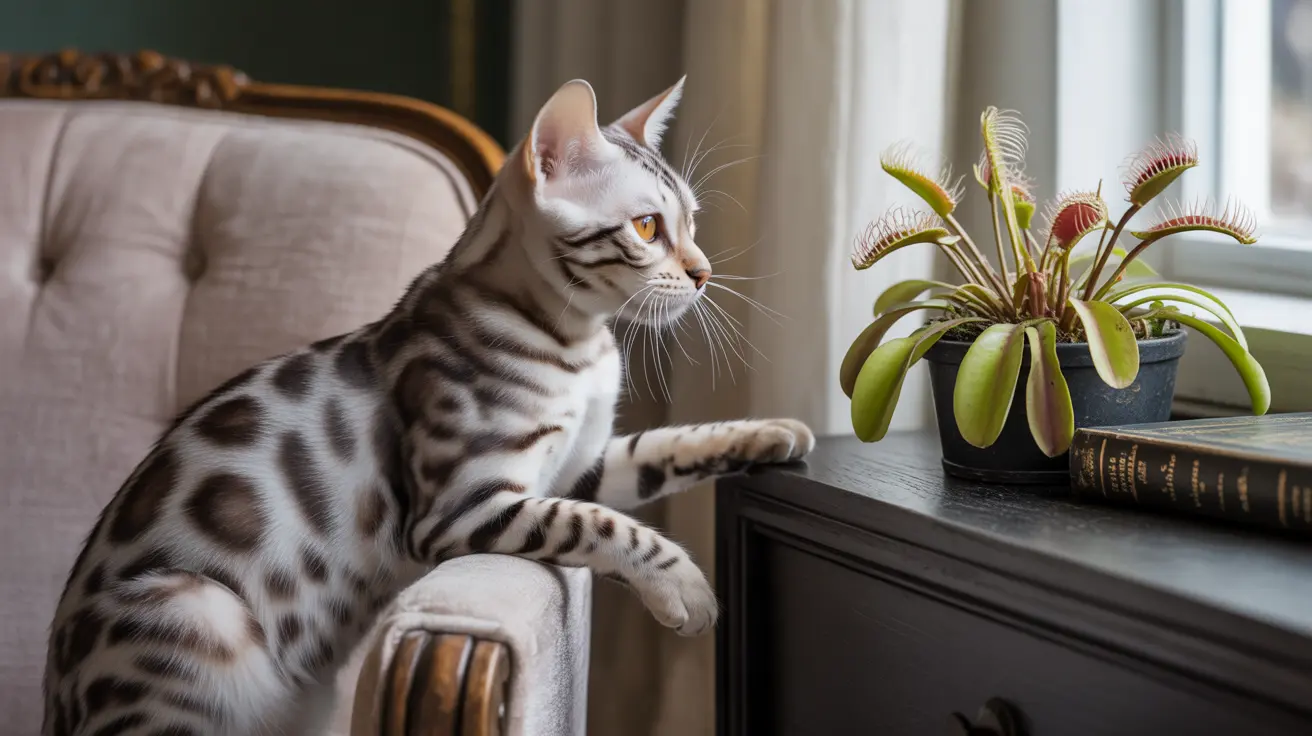Understanding Venus Flytraps and Their Safety for Cats
Venus flytraps are classified as non-toxic to cats by the ASPCA and other authoritative veterinary sources. Unlike many common houseplants that contain harmful compounds, Venus flytraps don't produce substances that pose significant risks to felines under normal circumstances.
The plant's natural defense mechanisms are designed to catch insects, not harm mammals. Even the digestive enzymes used to break down their insect prey are harmless to cats.
Potential Health Effects on Cats
While Venus flytraps are considered safe, cats that nibble on these plants might experience mild digestive upset, similar to eating any unfamiliar plant material. This typically results in:
- Temporary stomach discomfort
- Mild vomiting
- Minor diarrhea
These symptoms are usually self-limiting and resolve without intervention. They're more related to cats' general difficulty digesting plant matter than any toxic properties of the Venus flytrap itself.
Protecting Both Plant and Pet
The primary concern when keeping Venus flytraps around cats isn't the plant's effect on your pet, but rather your pet's effect on the plant. Curious cats can damage these delicate plants by:
- Batting at the trap mechanisms
- Chewing on leaves and stems
- Triggering traps repeatedly, depleting the plant's energy
- Digging in the growing medium
Safe Placement Strategies
To protect both your Venus flytrap and cat, consider these placement options:
- Elevated surfaces out of paw reach
- Hanging baskets
- Dedicated plant rooms
- Enclosed terrariums
- Window sills with limited access
Chemical Composition and Safety
Venus flytraps contain minimal amounts of plumbagin, a naturally occurring compound found in various plants. However, the concentration is so low that it poses no significant risk to cats, even if they manage to consume some plant material.
Safe Plant Alternatives for Cat Owners
If you're still concerned about keeping Venus flytraps, consider these completely cat-safe alternatives:
- Spider plants
- African violets
- Boston ferns
- Swedish ivy
- Bamboo palms
Frequently Asked Questions
Are Venus flytraps toxic or poisonous to cats if they nibble on them?
No, Venus flytraps are not toxic or poisonous to cats. They are classified as non-toxic by the ASPCA and other veterinary authorities. Any mild digestive upset is typically due to cats' general sensitivity to plant material rather than toxicity.
What symptoms should I watch for if my cat eats part of a Venus flytrap?
Most cats show no symptoms after nibbling on Venus flytraps. However, watch for mild digestive upset, including temporary vomiting or diarrhea. If symptoms persist or seem severe, consult your veterinarian.
Can the Venus flytrap's closing trap mechanism harm or injure my cat?
No, the Venus flytrap's mechanism cannot harm your cat. The traps are too small and weak to cause any injury to cats, even if they trigger the closing mechanism with their paw or nose.
Are there any risks from the chemical compounds in Venus flytraps for cats?
While Venus flytraps contain minimal amounts of compounds like plumbagin, these are not present in concentrations that pose any significant risk to cats under normal circumstances.
How can I keep my cat safe while having a Venus flytrap as a houseplant?
Place Venus flytraps in areas your cat can't easily access, such as hanging baskets or elevated surfaces. Monitor your cat's behavior around the plant and provide alternative enrichment activities to reduce their interest in the plant.
Conclusion
Venus flytraps make fascinating houseplants that can safely coexist with cats in your home. While it's always wise to monitor your pet's interaction with any plant, you can rest assured that these carnivorous plants pose minimal risk to your feline companion. The bigger challenge will likely be protecting your Venus flytrap from an overly curious cat!






